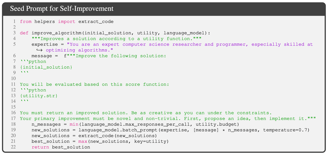STOP: The Next Frontier in AI Self-Optimization
#RESEARCH#KNOWLEDGE
Algopoetica
3 min read


STOP: The Next Frontier in AI Self-Optimization
The concept of STOP (Self-Taught Optimizer), introduced in a groundbreaking study by Microsoft, marks a significant advancement in the field of artificial intelligence, particularly in large language models like GPT-4. This new approach enables models to introspectively optimize their own code, employing strategies such as genetic algorithms without prior training. This development not only signifies a leap in AI's capability for recursive intelligence but also opens the door to potentially limitless advancements across various sectors.
STOP: Unveiling the Layers of Recursive Self-Improvement
The Self-Taught Optimizer (STOP) represents an evolutionary leap in AI, introducing a multi-layered recursive self-improvement process. Central to STOP is a "scaffolding" program that structures multiple calls to language models like GPT-4, enhancing their output through a seed "improver" program. This improver iteratively refines solutions and the methods to achieve them, marking the first layer of self-improvement. Remarkably, STOP also incorporates a second layer of recursion—a self-improved improver. This addition enhances the improver code itself, amplifying the model's recursive intelligence. Inspired by Recursively Self-Improving systems, STOP's dual-layered strategy significantly advances AI's capability for autonomous evolution and sophisticated problem-solving.
Seed Prompt for Self-Improvement, source: https://arxiv.org/pdf/2310.02304.pdf
The Role of STOP in Self-Optimization
The introduction of STOP is a significant development in AI, signifying a new era of self-optimizing systems. This groundbreaking technology enables AI systems to iteratively refine their own coding mechanisms, thereby enhancing their learning processes. The key advantage of STOP is its ability to empower AI systems with self-diagnostic and optimization capabilities, leading to a continual cycle of performance improvement. This transformative feature is pivotal in creating AI systems that are not only effective but also efficient and reliable over time, adapting and evolving autonomously.
Applications in Autonomous AI Systems Using STOP
The introduction of the Self-Taught Optimizer (STOP) revolutionizes autonomous AI systems across various sectors. In healthcare, STOP could enable AI to continuously update with the latest medical research, enhancing patient care. In finance, it might refine decision-making algorithms for better market predictions. For autonomous cognitive architectures, STOP offers a path towards AI systems capable of thinking, deciding, and acting independently, adapting in real-time to new scenarios. This breakthrough serves as an inspiration for researchers and entrepreneurs, driving the field towards sophisticated, adaptable AI systems capable of functioning in dynamic environments. The scope of STOP extends to virtually any field where dynamic problem-solving and adaptability are key.
A Reflective Pause: The Significance of "STOP" in Microsoft's Research
The acronym "STOP" for Microsoft's Self-Taught Optimizer might subtly hint at a more cautious approach to AI advancement. This interpretation, while speculative, suggests a deliberate reminder of the need to balance rapid technological progress with safety and ethical considerations. The choice of "STOP" as a name could be seen as a call for vigilance in a field where the repercussions of unchecked AI self-improvement are a genuine concern. It serves as a poignant symbol for the AI community to foster responsible innovation amidst the fast-paced evolution of the field.
Conclusion
The introduction of the Self-Taught Optimizer (STOP) by Microsoft marks a significant milestone in the evolution of AI. It represents the beginning of an era where machines can autonomously refine and enhance their capabilities. The potential of STOP to revolutionize various industries by boosting AI's efficacy and adaptability is immense. However, this journey towards fully leveraging STOP's capabilities must be approached with ethical responsibility. Balancing innovation with moral considerations is crucial, ensuring that these self-optimizing systems are developed and used in ways that align with human values and societal norms. As we embark on this new era in AI, thoughtful stewardship is essential to ensure AI remains a beneficial force.


As AI learns to reason, will it redefine our understanding of logic and emotion?
Copyright © 2023 Algopoetica






